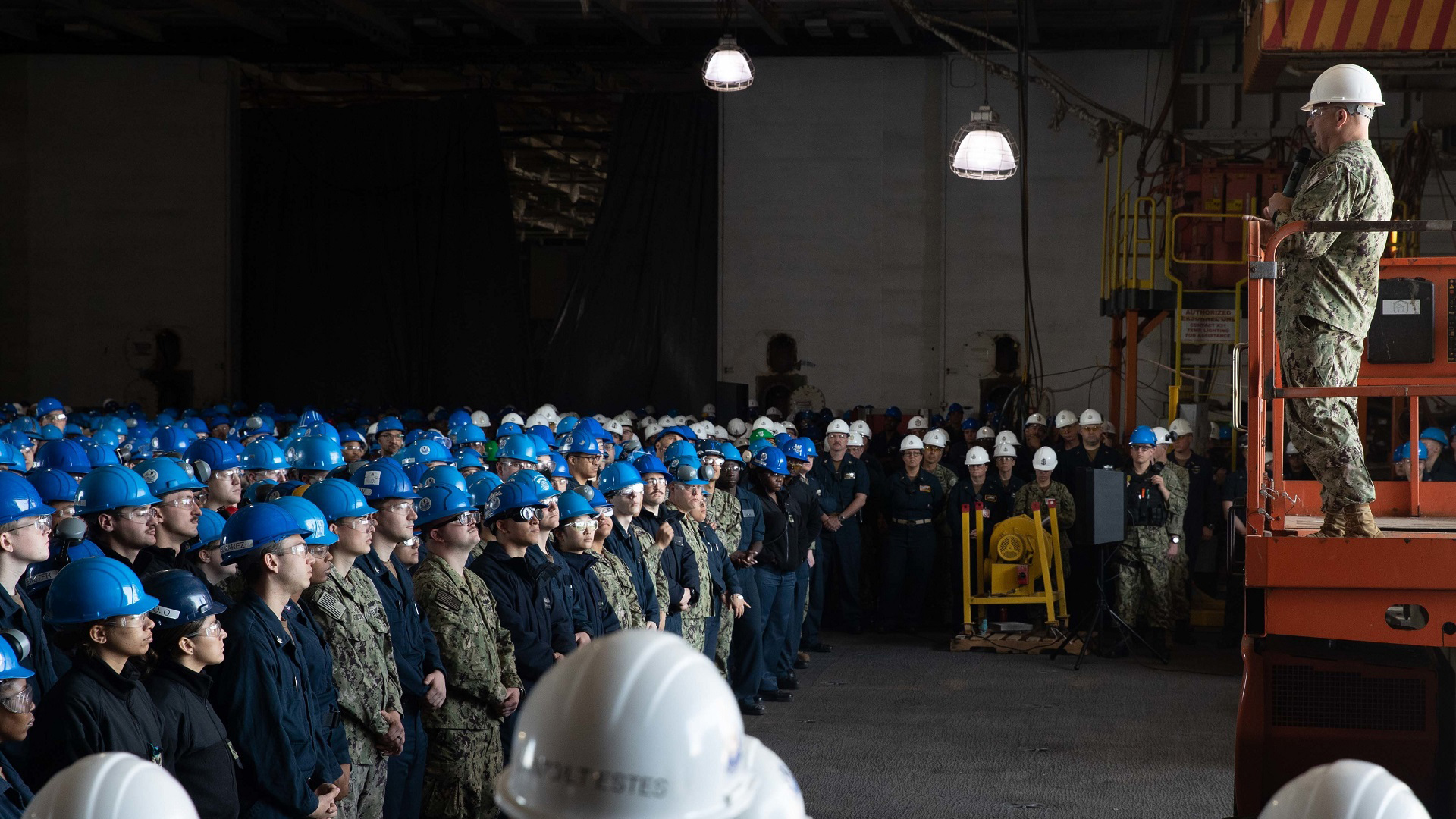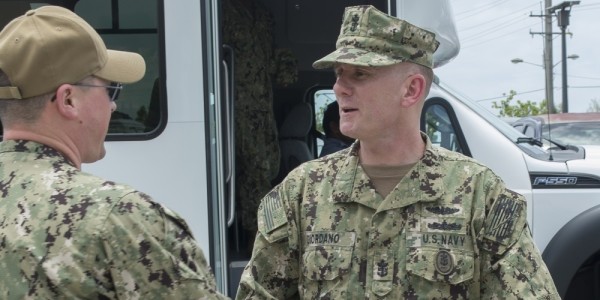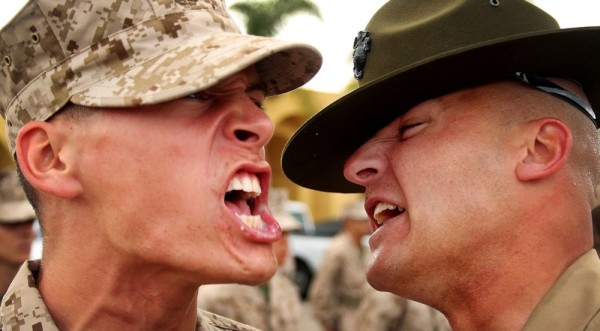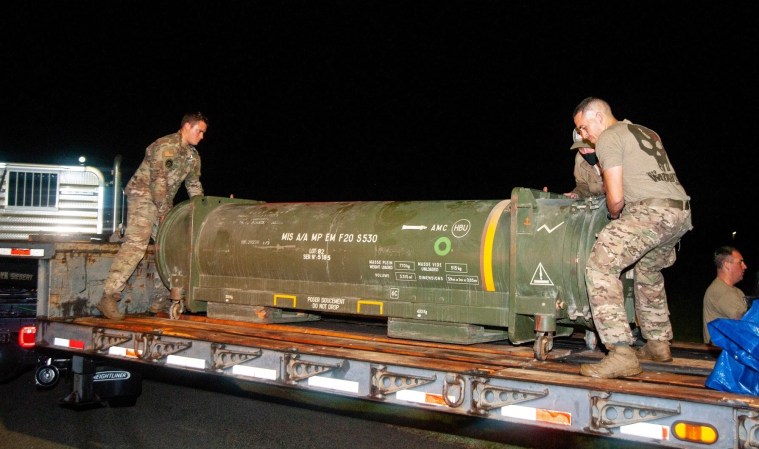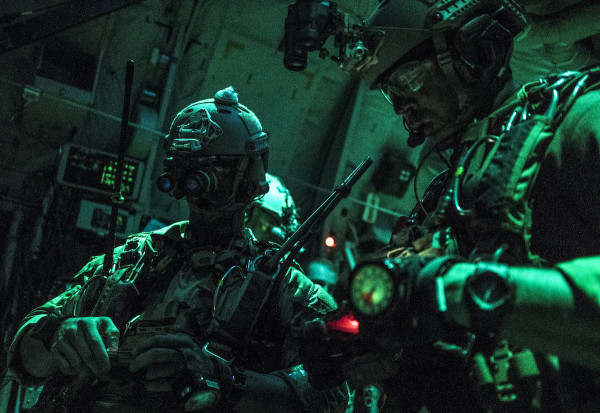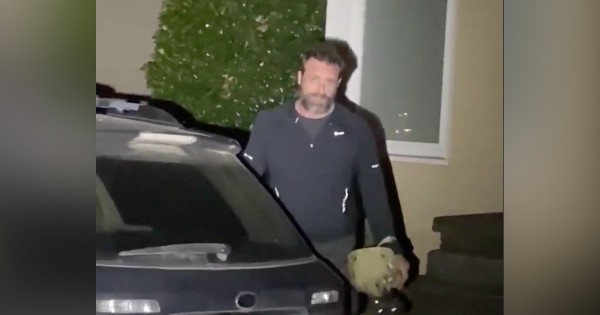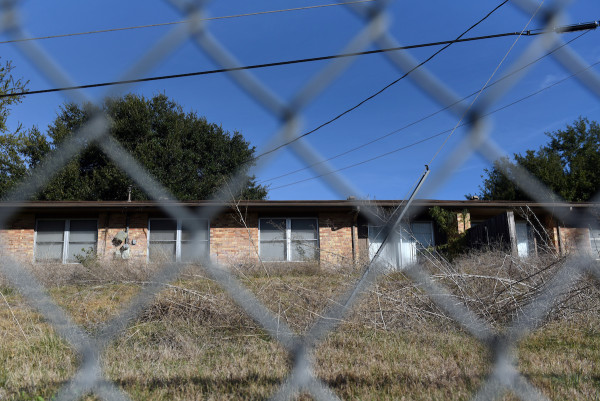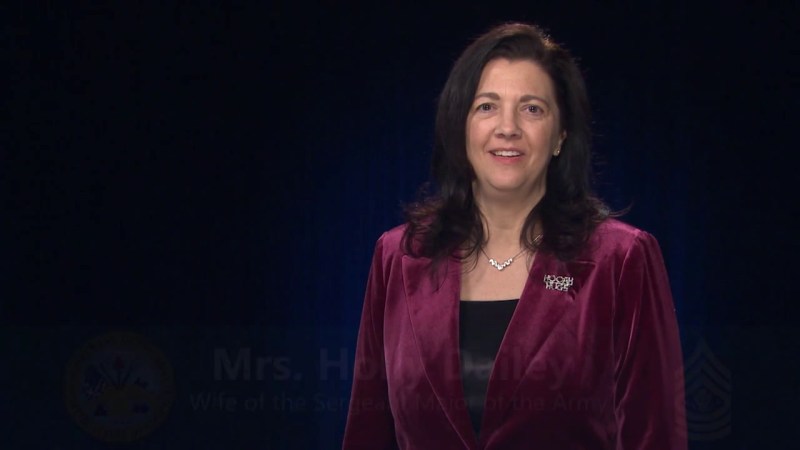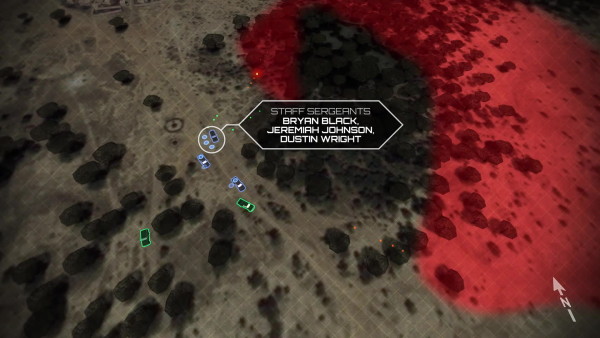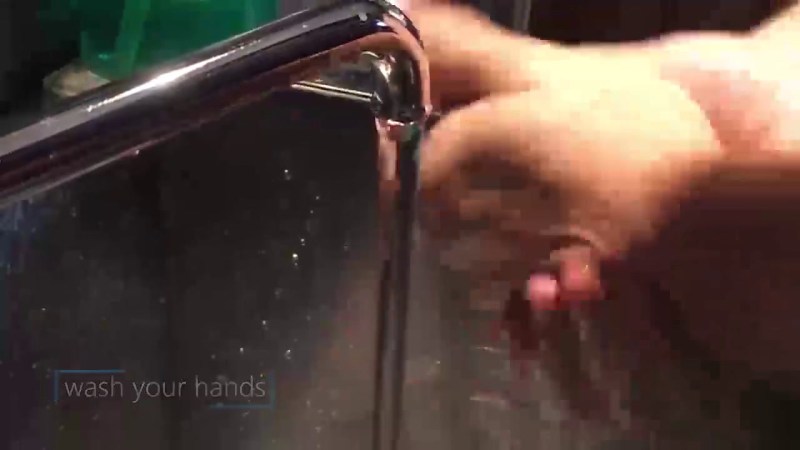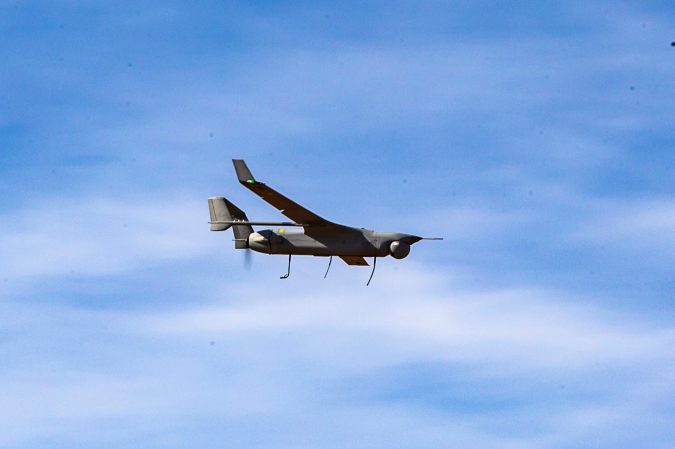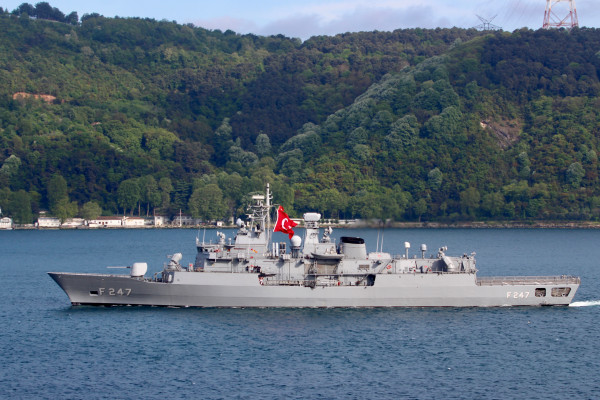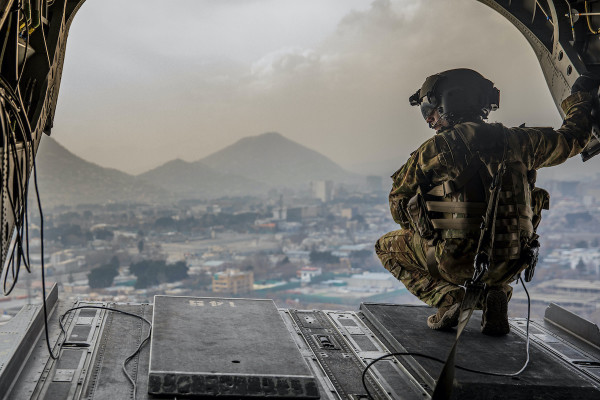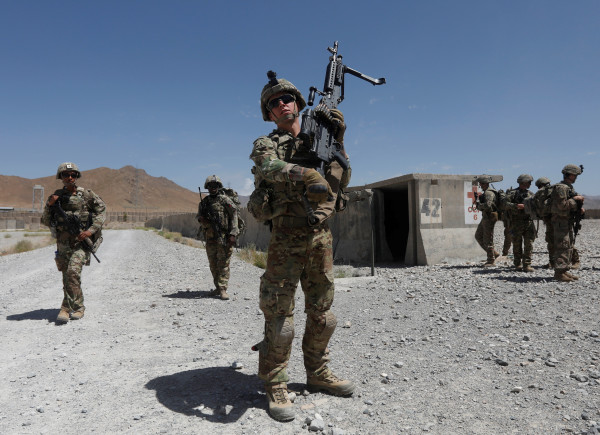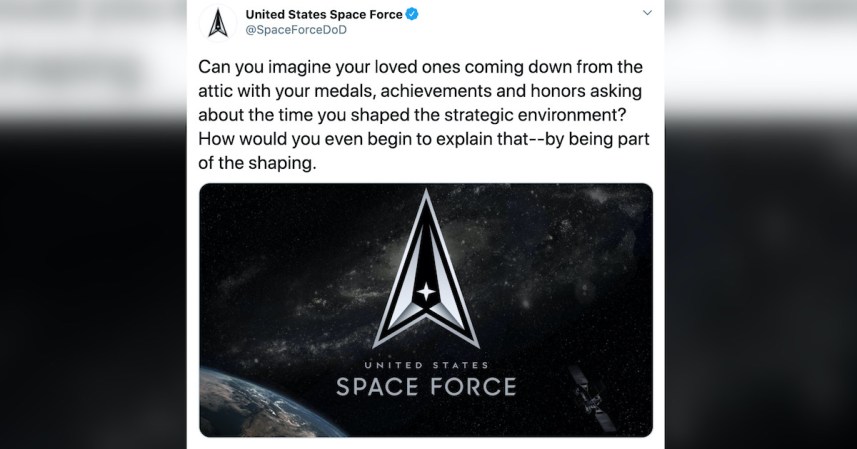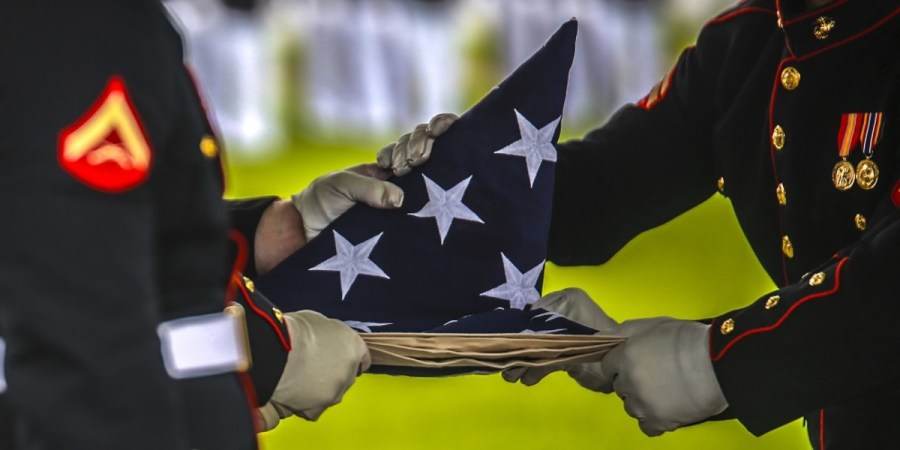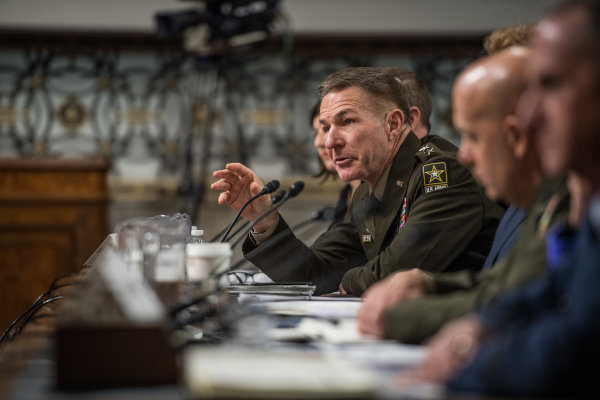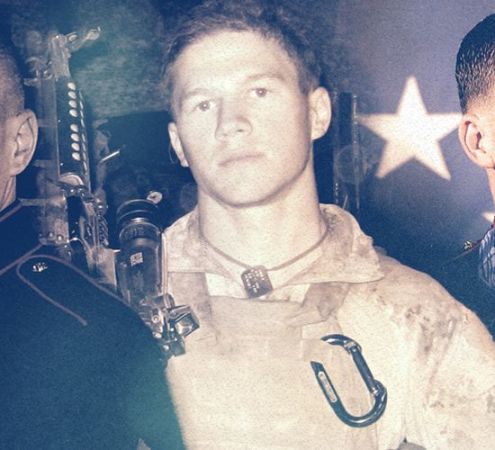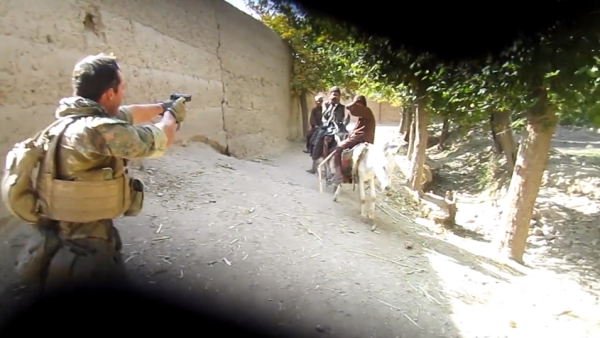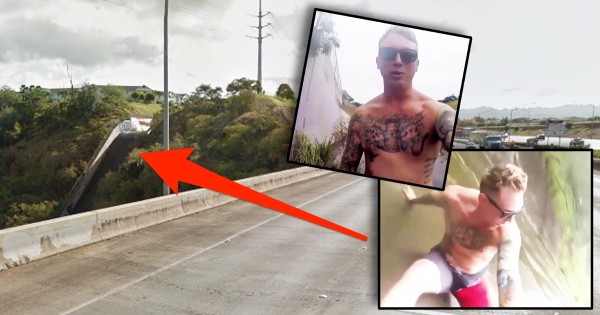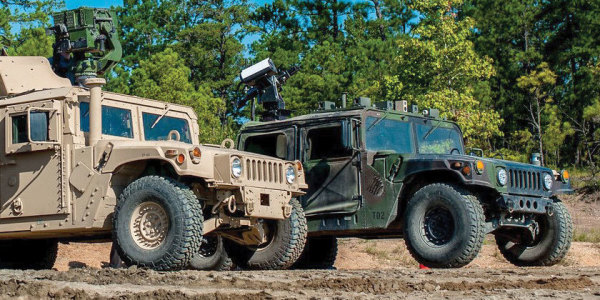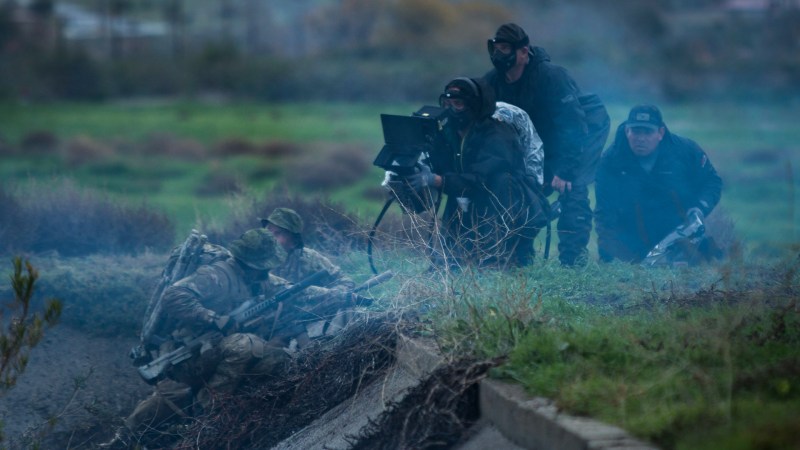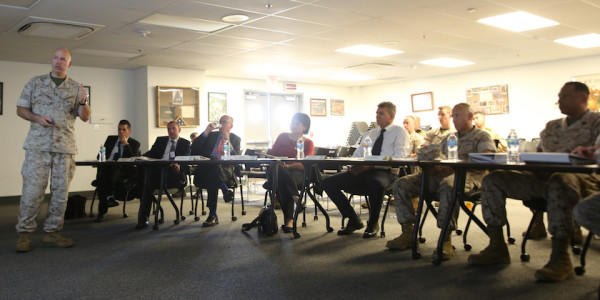When Master Chief Petty Officer of the Navy Russell Smith visited the aircraft carrier USS George Washington recently, he took a lot of questions from the ship’s crew about a wide range of issues, including mental health, retention bonuses, and what will happen to sailors who have refused to get vaccinated for the novel coronavirus (COVID-19).
Smith has issued a statement saying he will share the sailor’s concerns with Navy leadership after some people posted on Reddit that they felt he was dismissive when answering a crew member’s question about how to make the aircraft carrier more habitable while it is undergoing an overhaul in a shipyard.
Subscribe to Task & Purpose Today. Get the latest in military news, entertainment, and gear in your inbox daily.
The Navy has also posted a transcript of the 50-minute question-and-answer session aboard the carrier, which Smith visited following the deaths of up to 10 crew members in as many months, of which one is a confirmed suicide and three others are being investigated as potential suicide deaths.
“I am not going to have an answer that’s going to make you real happy,” Smith told one sailor, who asked him how the USS George Washington could be made more habitable during its overhaul.
Smith said the type of repairs being done to the aircraft carrier require turning off water to parts of the ship and shutting off “some of the other hotel services,” but sailors still have to live aboard the USS George Washington during the shipyard work in case a fire breaks out on the vessel. “I’m sorry I can’t give you the answer that you want but that’s kind of where we are,” Smith said.
You can listen to an audio recording of Smith’s statements to the crew, which was obtained by Task & Purpose:

When a sailor said that ships undergoing this type of maintenance have higher rates of suicides and mental health issues, Smith agreed.
“I would tell you anecdotally, I believe the same thing,” Smith replied. “I can’t tell you if there’s quantification of that, but it feels that way to me too, uh, having been through this.”
Sailors join the Navy to deploy, and that is why morale is typically higher on ships that are taking part in combat operations, he said.
“When we were dropping bombs, life was good because we were doing the thing that the carrier was paid to do, and we felt like we were contributing,” Smith said. “I would argue the work is harder in the yards than it is on point ‘cause you’re trained for that and that’s your job.”
Smith acknowledged that the Navy does not have enough psychiatrists and the service is also looking at adding mental healthcare in shipyards, but he also said the country as a whole does not have enough psychiatrists, and the Navy cannot pay those specialists as much money as they could make in private practice.
“It’s not easy to get through the school and to pay your way through that school,” Smith said, according to the Navy transcript. “And by the way, when you’re really in debt and you owe a lot, because that’s what it took to become a psychiatrist, uh, the kind of debt you have doesn’t lend itself necessarily to come to the Navy and saying, would you like to make that money and pay back your student loans in about five to ten years? Or would you like to owe on that for the rest of your life and maybe … come into the Navy as a lieutenant?”
One crew member asked Smith if the Navy is considering offering retention bonuses for sailors already in the service, noting that the Navy is offering enlistment bonuses of up to $25,000 for new recruits.
“Are we doing anything for the people trying to stay in?” asked the sailor, whose name was not included in the transcript.
“Yeah,” Smith replied. “You show up. If you’re in a rating that’s short and, and you have an SRB [Selective Retention Bonus]. You that’s, that’s why we have it. Money is a tool. It’s a lever. It’s not a: ‘I like you, so, I’m going to give you some money.’ I appreciate your service. I give you a paycheck for that.”
Another crew member asked when sailors who have not been vaccinated for COVID-19 should expect to be separated from the Navy. Smith said there is a pending court challenge to the Navy’s ability to kick out unvaccinated sailors that could take a while to resolve.
“So only the people that claim some sort of religious accommodation, uh, are on hold,” Smith said. “Everybody else is still being separated if they haven’t gotten a vaccine. So I think once we get to a ruling on that, that’s, I don’t know if it’s gonna be weeks, months, could be as long as a year, before the court system gets to that, uh, the Supreme Court came in very quickly and said, actually, the Navy can remove somebody from command or from a deploying status. Uh, if they haven’t gotten the vaccine, cause that’s where they are risking not just themselves, but the unit.”
Read the entire transcript of Smith’s comments below:
MCPON All-Hands Call Transcript on USS George Washington
USS George Washington
INTRODUCTION: George Washington, good morning crew at ease. We’ve got a very special guest on board today, please welcome aboard the Master Chief Petty Officer of the Navy, Master Chief Russell Smith.
MCPON: How you guys doing? Uh, so you shouldn’t have clapped yet, cause you don’t know if I’m gonna say anything that’s worth clapping for, but I appreciate that. Uh, Hey look, I know you guys have a lot going on. You guys are, uh, I would say probably waist deep or chest deep in this, this yard period. Um, on the home stretch. I think you come back out of this, you know, less than a year, right? So, uh, like any good race car driver, um, they have mechanics, but a good race car driver is gonna put his head under the hood and look at the engine, gonna look at the lines, uh, and do a lot of kind of looking around and, and taking ownership of that thing that thing they’re gonna take around a track. Um, it’s not easy for sailors. This isn’t the thing we advertise generally with Navy recruiting, uh, to come to this, uh, or this part of the life in a ship, but to turn around and give a carrier another, you know, 20 to 25 years of, of service life to do what the Truman’s doing right now.
Uh, we rely on sailors that have that kind of ownership because divesting ourselves of that and handing that off to somebody else, pulling completely, we wouldn’t have that same buy-in that we have because we’re the ones that take this thing back out to sea, and we use it. So for what you’re doing, I know it’s not easy. I’ve been in two dry dock, uh, availabilities with, uh, Abraham Lincoln and Carl Vinson, and it’s not easy. Um, having to wander around, you know, 30, 40 frames looking for a working head, refining hot water is, it’s not pleasant. I get that, but thank you for what you’re doing. It, it means a lot. And the, the defense that you’re giving back to the nation in a shift, that’s gonna be ready to go for another two decades plus, uh, is, is more than we could have asked of you and we appreciate that.
Um, I stopped by cause uh, I planned to see Stennis and I’ve been planning that for a while, but I just dealt with recent events, that it would be good to come by here. I don’t have a planned agenda. I don’t have a whole lot of stuff to tell you. Um, I want to make this time valuable to you. So I’m gonna turn this over in a second to you and let you ask me questions so that we can talk about what it is you want to talk about, not what it is I feel like talking to you about. Does that make sense? So, uh, whatever’s on your mind, doesn’t really matter. We can talk about anything you want. Um, I’ll even explain beards, but, um, this isn’t my first trip to Stennis. Last time I was onboard Stennis was, or not Stennis, um, GW, was when I was at N1 and we came by very briefly, um, just to talk to the crew and, and see how you guys were doing. So it’s interesting to see you guys here at this point, hopefully getting ready to take this thing out, back out to sea and do what you’re supposed to do with it. So, um, if you’re watching events in the news and you’re watching, uh, the way the war in Ukraine is going, you can kind of see that, um, having a ship like this just nearby, um, even if we’re not engaging, Russia, uh, can influence a lot, including the outcome, hopefully of that conflict. So, um, make no mistake. The carrier is still the centerpiece of national defense and it’s gonna be, it’s gonna continue to be for the foreseeable future where we have to take a fight to an enemy rather than fighting here at home. So what’s on your guys’ minds? What can I talk about? What, what questions can I answer?
[PAUSE]
TIME 04:19
MCPON SMITH: A reader writes, “Do you think the draconian measures in the ship, military, country, adopted for the past two years, to fight a virus with an exceptionally high survival rate is to blame for the rise in suicides and the decreased interest of, of eligible citizens to, to join the Navy in the military?” Also, “Can I leave the Navy yet? Or are we still unsure of how to proceed with executing punishment for a potentially unlawful order?”
I’ll probably take that second question just between me, you and the chain after this. Uh, but, um, when COVID first started, there was a reason that we had masks and that we isolated ourselves because something where 60 percent of the population that got COVID was never even gonna know they had it. That sounds like that’s a high number, right? 60 percent. Not even to know you have COVID, no symptoms, no sickness, nothing. Just, you had it, it’s gone. You may not have, if you were not tested, you didn’t even know you had it. About 30 some percent were gonna get sick, not real sick, but they’re gonna get sick. They were gonna get the sniffles, get the cold, get the flu, something. About one or two percent, we’re gonna have to fight for their lives to make it. And many did not.
TIME 05:55
When you talk about 350 billion, or 350 million, people in the United States, when you start saying one or two percent, that’s a lot of people. And hospitals did not have that many ventilators, uh, emergency rooms did not have that many beds. So the way you stop or slow that down, because it was not a matter of “Can we treat you?” it’s “Are the resources like a ventilator gonna be available?” if you’re in that two percent that gets sick. So we did things like masks and we did things like isolate. And we did try to minimize the exposure because as it spread, if you got it, if you were part of that unlucky one or two percent, you were gonna have to fight for your life. And if you were really sick, if you had underlying health conditions, if you were diabetic, if you were severely obese, there were other ways that this was gonna affect you in a more pronounced way. So there was a reason for the things that we did. Fast forward to now, and the reason that we needed a vaccine was because now, if you have the vaccine, the worst you’re gonna get is the flu. Theodore Roosevelt had 90 cases of COVID and in the timeframe that they managed to get the crew off and into a safe place where they wouldn’t continue to spread it, it spread so rapidly that it put some people at real risk it, uh, and we lost a crew member. And actually of the DOD losses of all the military services, the Navy has had the heaviest because of the close crew environments, air, crew, aircraft, and ships and submarines. But we, we would’ve been far worse, had we not taken those draconian measures that this…this sailor talked about out, those were necessary. Lincoln got underway, not too long ago, with 122 COVID positive cases.
TIME 07:50
I started getting phone calls, 11:30 at night, the story hits the press like, oh my God, what’s going on? Haven’t we learned anything from tragedy? It’s like, no, we’re all vaccinated. The worst they’re gonna get is the flu. If 60% don’t even get the flu and the remainder do, the worst they’re gonna get is the flu. And a carrier medical could probably get through 122 cases of flu. So the vaccine has allowed us to do things we haven’t like port visits, like actually going places, doing things. Uh, and at this point, as you can see, not wearing masks. Uh they’ve even, I think temporarily suspended masks on mass transit. I’m not sure if that’s air travel, but definitely like the Metro and places like that, cities that have mass transit, they’re not making you wear a mask, it’s just recommended. because if you’re vaccinated, it doesn’t matter. The worst you’re gonna get is the flu. You’re COVID positive, does it matter? Are hospitals being overrun, are medical facilities being outstripped? They’re not. So then do we need to wear masks because we’re worried about the transmission rate? I would argue we’re at a point where we don’t need to worry about that as much anymore because of the severity of what happens if you get it, because we don’t track any other version of the flu. And that’s exactly what COVID is. It’s a version of the flu. It’s just a very violent and deadly one. So, um, what we did was necessary and now that you see it’s not wearing masks, it’s because the vaccine has relegated to not being necessary. Um, and we can certainly talk about the other issue then. So what else can I answer for you guys? Oh, here comes somebody.
SAILOR: Morning MCPON.
MCPON: Morning. Uh, let me, let me get this guy real quick and I’ll get you right after. Sorry So I have a one AB per day limit. Just kidding. Yeah.
OTHER SAILOR: I totally forgot. I’m not good on [inaudible]
MCPON: [laughs] Take a second. Think about it. Don’t go anywhere but yeah, think about it.
SAILOR: Good morning MCPON. Uh, Chief _____ here, I work down in the 3M office here aboard GW. My first question would be, has there been an increase in mental health, uh, cases or, uh, you know, SRB throughout the Navy, and uh, the second question to that would be, uh, if, if those numbers have risen, um, recently, or, uh, you know, um, in, in, in the recent, uh, past, uh, is there any plan of action to have more support, uh, brought into the Navy?
TIME 10:36
MCPON: So anytime you talk about issues like this, it’s a challenge, because what matters to you is what you see, and what matters to you is what you deal with. If I tell you that that hike up to 8,200 feet on that peak is not a big deal because I’ve gone up Everest, uh, it doesn’t really matter. What stands before you is the mountain that you have to climb, and that mountain is the tallest mountain there is. So if I, when I tell you that that suicides five percentage across the Navy have actually gone down this year, unlike a couple of other services, does it matter if locally that’s not your experience because of what you’re dealing with here? Um, it doesn’t. So I’m not gonna tell you about the Navy. I’m gonna tell you that I understand that we still have a problem and the department has been focusing on it, but the problem is beating suicide is like beating cancer. It’s trying to, there are many different causes, many different reasons. Sometimes it’s pain avoidance, sometimes it’s fall from grace or embarrassment, and sometimes it’s prolonged pain that you just can’t end, and that seems to be a much better thing to do. Uh, there are lots of reasons that people take that stuff. I’m gonna tell you early in my life, and I won’t tell you whole story from here, but you know, what preceded me coming into the Navy was, uh, a loss that left me in a place that at one point I wasn’t sure if there was a future on the planet for me and I ran away and joined the Navy. And after a couple years, uh, in a magazine below decks, I had my hands inside of the bomb, and I kept thinking if I make a mistake, everything from Daily City to Walnut Creek goes away in a fireball. And in Susanville, California, where I went to high school, they’ll see that fireball 300 miles away. And the Navy trusts me enough to do this job despite a whole lot of baggage and shit that I came with. Um, I like this place and I felt like I belonged. I had an asshole for a senior chief, um, at one point my DIVO sucked, but my teammates were amazing. And I had a chief that was amazing. And I felt that sense of belonging that on those first two ships, and then from there on mostly, uh, with seal teams, but also on a couple carriers, I felt like I was a part of a team that I needed it and they needed me. And, um, that symbiotic relationship that we had, um, and still have, I still text probably several times a week, all the members of W division that were there with me on Lincoln in 1990, 1990 to 93.
TIME 13:20
So, um, those bonds we have can last a lifetime, contrast that to some sailor who shows up somewhere, maybe gets in a little bit of trouble. The chief starts to write ’em off as a waste of time because these 13 sailors are killing it. And this one just does nothing to get in trouble. So instead of focusing on that one to get them up to speed, maybe they focus more on the fast runners. I mean, that was me, honestly, as a first class, as a new chief, I had to learn from my chief that there is equal or greater value in finding some of those who feel like they’re falling behind the pack, and getting them caught up. And that’s something that we have to do more and do better, uh, because I think that’s gonna help. There’s also something I was just telling Eric [last name] that the, um, the mess has a massive role in when a sailor comes in and sits down and says, “I got a problem,” instead of saying, “Hey, go see the chaplain, go see the doc. If you want to leave, just get off the ship” instead of saying, “no, I’m gonna get you an appointment and we’re gonna set this up. Cause I need you back.” The end of every phrase should be, “I need you back”, just like, if someone hurt their knee and you had the time and you weren’t gonna be made to transfer and put them off the ship, it’s like, get, well, man, cause I need you here. Uh, I don’t have a whole lot of extra sailors and I got a lot of work, so let’s get you right, and let’s get you back on the team. The only difference between sailors on a carrier and sailors at seal team four is the attitude between them as teammates, because we both have shitty jobs. Where are the ABs in here? ABES? V2? Uh, longest hours, shittiest conditions, least vacation on the front end, least amount of recognition for the hard work you do. Um, and always last in the chow line. So, um, there’s no difference between that and being with a seal platoon in Columbia, hunkered off the side of a river in knee deep mud, um, doing real shitty work, they’re both hard to do. The difference is the camaraderie between them and understanding that everybody’s needed on the team and how we talk about that team mentality. And that’s where we can, we need more mental healthcare. We just hired 133 new workers. We have more DRCs than we’ve ever had. Um, we’re putting chaplains on destroyers and smaller ships, which have never had their own. Um, but we are also each other’s counselors.
When I went through a divorce last year, I tried to get a mental healthcare, uh, appointment and they said, Hey, it’s gonna be six weeks. I was like, well, I’m gonna be in a very different place in six weeks. So I think I’m gonna, I’m gonna take care of myself cause I can afford to. Um, but one of the reasons that vice chief is leading this group to try and figure out how to scale up what we do in NSW, uh, what EOD folks do and what we’ve done in pockets in surface warfare and aviation and submarines, um, to scale that up, to make more available, cause we could keep hiring new people, but the need is gonna continue to strip it. What we do as leaders, as first class petty officers, as chief petty officers to sit down and take them in and go, man, my day is getting longer, in your head, say that, sit down and go, “What’s going on with you?” and not walking by someone who’s got that face that you know, something’s wrong. Uh, but maybe you’re thinking I got a maintenance requirement and I gotta brief the CO and department head in an hour.
No department head worth their salt should look at you as a senior chief and say, I think you should have walked past that sailor who looked like they were on their last leg because I needed to take that briefing. You know, at 1400, you can communicate that and say, “Hey, please tell ’em I, I need to be late. Uh, let ‘em know that I can’t make it right now because there’s a problem I can’t walk past,” and explain yourself later. Um, that’s what we should be doing to look out for our teammates. That make sense? Yeah. Hooyah. Thanks. Thank God you remembered, all right.
TIME 17:32
SAILOR: Uh, you mentioned how you hired a lot of, uh, chaplains and whatnot. And you know, usually if I brush my teeth, I don’t, I don’t need a doctor, no offense to any chaplain, please, you know, don’t take this the wrong way. If I brush my teeth, I don’t need a doctor to do that. But when I have a cavity or anything wrong with my mouth that I can’t handle myself, obviously I’ll go to a dentist. I’m a man of God. You know, I don’t mind going to a chaplain, but a lot of these people, you know, it’s…rather than having chaplains why not get psychiatrists or?
MCPON SMITH: So
SAILOR: a doctor?
MCPON SMITH: Like I said, we hired a bunch of new people, but the problem is the nation doesn’t have a whole lot of psychologists, psychiatrists, and other mental healthcare workers out there in abundance. It’s not easy to do. It’s not easy to get through the school and to pay your way through that school. And by the way, when you’re really in debt and you owe a lot, because that’s what it took to become a psychiatrist, uh, the kind of debt you have doesn’t lend itself necessarily to come to the Navy and saying, would you like to make that money and pay back your student loans in about five to ten years? Or would you like to owe on that for the rest of your life and maybe be… come into the Navy as a Lieutenant? So, um, it’s hard to find those folks, even the few that there is, the nation is asking for more, more support than is available. And it takes a while. You can’t just snap your fingers and grow a psychiatrist. That takes years, decades of school and training and practice and internship and everything else that gets you to that point. So they’re not out there, they’re not hiring. They’re just not a lot out there. So no one should be pushing you to see a chaplain. One of the things I like about the MHOOD clinic in San Diego is you walk in and say, I don’t feel good. And a master intake specialist sits down with you and has a conversation. If they think that a chaplain can help you, and they get this right about 94 percent of the time, I’m gonna send you to see a chaplain, I think you need to see a psychiatrist, I think you’re gonna be okay if we put you with a licensed clinical social worker who can help you talk through some of the things that you’re trying to deal with, but they don’t rise to the level of psychiatric care.
Um, and by putting people in the right place the first time, you also let alone the system, by not sending you to see the chaplain, well, that’s not what you need. Does that make sense? So that’s one of the things that we’re trying to figure out, how do we scale up? Cause it’s working in San Diego, why can’t we get that in Norfolk? You know, how else can we replicate that? Um, the sailor resiliency center is a trailer on the end of the pier in Rota, Spain, where we have four trainers and they have had an amazing success rate, getting sailors back to the ship, they walk off to see them, instead of being Medivac’d back home to see the psychiatrist, its often the psychiatrist that’s in that trailer. They find what they need. They go back to work and that’s been really, really successful. Finding ways to replicate that informal kind of care, uh, has been wildly successful. Somewhat like DRCs, but using actual psychiatrists to do that work. So, um, there are a lot of things that are going on to try and provide more. But like I said, the chief that was standing here before, there’s also more that we can do as leaders and teammates to, to, to help so that we can alleviate maybe some of that, some of those smaller things from turning into something big. Does that make sense?
SAILOR: Yes, Master Chief.
MCPON SMITH: Okay. Hooyah. Thanks.
TIME 21:10
SAILOR: Good afternoon, Master Chief, my name is {Name Removed for Privacy}, uh first and foremost, I’d like to thank you for being here and hearing, uh, some of our concerns and some of our questions. It may be because I am a {Rate Removed for Privacy}, but I believe very strongly that an ounce of prevention is worth a pound of cure. And I would like to ask if you have any plans along with the CNO to address potential habitability concerns for RCOH and ways that these may affect our sailors moving forward. I take a lot of pride in the Navy. However, for some sailors, this is the only chance of operational duty that some will see. This is a full set of orders for all the sailors who will be here unless they live off or leave the ship for other reasons. In moving forward, there’s a lot of issues that we face daily from the day the ship pulls in until the day the ship leaves. Some of those things include the allocation of our BAS to ship meals, parking issues, cold water, hot water. Living standards that aren’t necessarily up to par.
MCPON SMITH: So I would, I would, I would…I would say I don’t agree with that contention. “Up to par?” How many carriers have you been on that have been in a dry dock?
SAILOR: This is my first carrier.
MCPON SMITH: Exactly, and I think we probably could have done better to manage your expectations coming in here because it’s not…you’re trying to fix a warship this size. Legally and from a safety perspective, you have to, at times, have a certain percentage of the crew that’s onboard the ship. So to do that, you are sometimes going to be in a situation where you’re gonna have to walk 30-40 frames to find the working head.
I’ve done that as a seaman and I’ve done that as a senior chief. I was telling the CO, one of my favorite moments from Lincoln, in drydock, was watching Captain, retired Vice Admiral, Carr walking past me with a towel over his shoulder, I was like “Sir, where are you going?” He goes, “I’m trying to find a working shower, there was no hot water in my head.” and uh, no one is immune to it.
You know, there’s positives and negatives to everything. Parking sucks and believe me, parking is the only privilege I have ever really cared about. I don’t care where I sleep, I don’t care where I gotta eat, but man I care a lot where I park. I hear your concerns and you should always raise them but you have to do so with reasonable expectations and then understanding what…what this is like. What you’re not doing is sleeping in a foxhole like a marine might be doing. What you are doing is going home at night, most nights, unlike the Harry S Truman. So when you’re here, some of it is that you have some more stability in that you’re here. The downside is some of the shit that you have to go through logistically will drive you crazy.
When people say there is no food, I can’t serve food 23 hours a day on the ship that’s up on the blocks. That’s not cost effective. Most of you don’t want to eat it. But we will serve um, a couple hours a day three times a day. I guess you guys have some folks from reactor department that are on here at night. So there is some food provided even though it’s not a gourmet meal. But no one is telling a Marine that’s out in the field or a seal that’s on a boat on a river, “Hey, I’m going to get you that hot meal tonight.” Sometimes, you’re going to have to live through and this is the circumstance in the community in which you serve and in which you live. There is a necessity for sailors to have ownership in this process. And being on a ship in the yards, that’s why we don’t just turn it over to the yards and say “every sailor is leaving and we’ll be back when the ship’s ready.” We have to do some of that work ourselves. To do that, the conditions are not always great. When someone walks by you at Starbucks when you’re in uniform and says “thank you for your service,” this is one of the things that they’re thanking you for, because they know that they can’t or they chose not to do that thing that you are doing. And without you we don’t have a capital ship, without you, we don’t have national defense.
I am not going to have an answer that’s going to make you real happy. What I can tell you is, this is what happens on a carrier in RCOH, and at some point, you’ve got to shut some of the water down and shut some of the other hotel services down and they’re gonna have to move around who’s living on the ship in order to make it work and meet the safety requirements, because you also don’t want to not have this thing manned, if a fire breaks out or something else because we’ve also been through that. Does that make sense?
SAILOR: Uh yes Master Chief thank you.
MCPON SMITH: I’m sorry I can’t give you the answer that you want but that’s kind of where we are.
TIME 25:59
SAILOR: Good morning, Master Chief
MCPON: Morning.
SAILOR: Consistently both in the news and just among the fleet, ships in the shipyard have higher rates of mental health issues and suicides, um, is that correlations spoken of or discussed at higher levels? And if so, is there a plan to do something about it?
MCPON: Uh, so I haven’t seen the study. I would tell you anecdotally, I believe the same thing. Um, I can’t tell you if there’s quantification of that, but it feels that way to me too, uh, having been through this. How many of you signed up to go to a ship in the yards? How many of you thought, man, I can’t wait to be in a dry dock and not be an OS or an AB or a whatever. Um, and instead chip paint, um, and do all the things that we do to make our ship ready to go to war. I saw one hand. I have a feeling that was kind of a smart ass response. Oh, hang on we’ve got one. Um, no one wants to do that work. So if you’re less happy because you don’t feel like you’re doing the thing that you came here to do, you’re hemorrhaging your technical abilities in whatever rating you’re in. It’s not optimal. We know that. So every leadership team does things differently, um, in dry dock when I was on Vinson, not a lot of classified intelligence going on, not a lot of, uh, strike plans going on in the Intel center, so I made our guys, every week, present to the entire crew, um, some sort of unclassified briefing about something we’ve learned in history and try to make it interesting and tie it to what we may face in, in the future without discussing classified information. Um, I’ve seen some ratings, TAD people in other ships, so that they can get a little bit of taste of what it’s like to actually do the thing they are, you know, paid to do. Um, there are lots of ways you can motivate the crew and we don’t legislate it, because everyone is different. Uh, the needs of each crew are gonna be different and that’s why we have leadership teams to solve for that. Um, but yes, of course we talked about it and we know that and you know, more recently we were discussing, um, where we have, you know, as I said, there’s not enough psychiatric care in the Navy. So for the need that we have for it at the moment. And, does it make sense to have it at the pointy end where sailors often seem motivated to get something done. If they’re working, if they’re dropping bombs? When we were dropping bombs, life was good because we were doing the thing that the carrier was paid to do, and we felt like we were contributing. When you’re just cutting circles in the ocean going, uh, one what’s next? Um, and then you knew, cause you just got served lobster that, uh, an extension was probably coming. Like I’m about to go out and deliver, um, very soon. Um, that’s, that’s hard and um, but yeah, we’re aware of it and, and maybe putting more psychiatric care closer to where sailors are struggling rather than where we think the work is harder. Cause I would argue the work is harder in the yards than it is on point cause you’re trained for that and that’s your job. That’s what you love to do. Does that make sense? So yeah we’re talking about it. Thanks.
TIME 29:28
SAILOR: so I’ve been in the Navy a long time done quite a few dry dock periods, actually, my question would be, has big Navy really taken a look at the environment at Huntington Ingalls, as far detached as we are from any other Naval installation, any other support services, et cetera, and really thought hard about what kind of facility could we put close by this ship with a ship in RCOH to help support these sailors? Because if you really think about where we do our dry dock periods, you know, typically Puget Sound is kinda not the best environment. Portsmouth, Virginia is not necessarily the best environment, but you still have some support services that are close to the ship where sailors can go get away and get a break from the[inaudible mic feedback] whereas here the only way here for them to do that is to walk a few blocks, get on a bus and go ride somewhere, maybe Huntington Hall in southern Newport News. And hopefully they can get on a computer there and check their email because there’s also 2500 other sailors trying to share that facility at the same time. If they can’t go there they can go and there’s a subway, there’s a coffee shop. Short of that, the only place that all they have to go is to go the mall or somewhere like that (inaudible). So, you know, I know we’re not gonna get out of the RCOH business anytime soon we’re still building these carriers so theoretically we are at least 50 years from the end of ever having to do RCOH from (inaudible)around number five now, and you still haven’t cracked the code of how to better support sailors the who were on these ships on RCOH. My wife did RCOH over 20 years ago, you can tell how old she is. It’s been nothing different from then until now. We’re still experiencing the same struggles for these sailors. I’ll be a little bit better. Cause in 2000, we didn’t have PPV we didn’t have those initiatives in place, but at the end of the day, when you walk outside that fence line, it’s still the same Newport News it was in 2000 and we’re still telling sailors to go walk 20 blocks in a, not so safe neighborhood.
TIME 31:46
MCPON SMITH: So who’s gonna build who, I mean, for the, the other places you mentioned you, you’re right. Newport News, you know, unfortunately we’re a little bit of a victim of, of the geography. Um, but who’s gonna build coffee shops and internet cafes and restaurants and, and who’s gonna buy the land and then convince, you know, these franchises to come in and build that stuff.
SAILOR: I mean, more so kinda like, kinda like some of the other shipyards, where you have some of the other MWR facilities, you have cafes it’s like right there where the ship is, that’s kinda what I (inaudible).
MCPON SMITH: I think I hear you. Um, so you’re talking about MILCON money building something on base. Uh, I’m gonna be honest with you. I, I have over the last five years, um, damn near gotten into heated arguments that damn near got into physical altercations with varying, uh, senior military and civilian leaders trying to get 240 million dollars to get a firefighting trainer built at boot camp because what I actually need is basic DC qualified sailors who show up to ships, ready to fight a fire. So the, the thing that I’m trying to get built, that I, I absolutely sympathize with what you’re talking about. Um, and perhaps there are ways that no one’s gonna walk away from Huntington Ingalls and this facility to do. I mean, we can’t just build one, uh, a hundred mile south of here, and go, hey, we’ll compete, and by the way, we have a better experience for sailors. They kind of have, they have this business from us. They have to make the price point smart. But if I can’t get the money to build a firefighting trainer, so that the 22 sailors who showed up in the week before the Bonhomme Richard fire, um, show up and they don’t know what to do, and they’re now not just not helpful, they’re a liability Sunday morning at 8:05. I need to correct that first. Uh, and then I, I wanna start looking at things like, uh, rec facilities and, and other, you know, internet cafes and things like that that I might build, cause I can’t even get that firefighting trainer built. Not saying that what you’re asking is not valid and, and important and should be considered, I’m saying the priority staff, 15 percent of what we ask to get built gets built. And we’re only asking for really high priority things… building out a thousand childcare spaces. Cause another thing I desperately need is childcare facilities because everywhere I go, we are short childcare.
I get a lot of problems in every, every place I go, but the one problem I do get everywhere I go is childcare. And we only have the money to build out a thousand spaces. And as we did that over the last year, guess what the need increased by more than that. So I’m shorter than I ever was before. I, I hear you. Um, but there has to be some way that we can work to find food trucks and other things we can do. Get creative in how we enforce Liberty, uh finding ways to look at the schedule and maybe get sailors off out of this environment for a little bit longer at time. Something that is other than building a cafe so they can walk to something and go do that. Does that make sense? Okay. Yes, sir.
TIME 35:06
SAILOR: Good morning, Master Chief ______ here, um, above all, thank you for coming out and speaking with us this morning and answering questions. My question for you is I saw that we are offering a $25,000 bonus for new enlistees. Are we doing anything for the people trying to stay in?
MCPON SMITH: Yeah. You show up. If you’re in a rating that’s short and, and you have an SRB. You that’s, that’s why we have it. Money is a tool. It’s a lever. It’s not a, I like you. So I’m give you some money. I appreciate your service. I give you a paycheck for that. Uh, where I give you more than your paycheck, when I start looking at bonuses, what’s your rate? What is it?
SAILOR: MC
MCPON: MC. Okay. So I suddenly could not convince an MC to stay in and manning or, or, uh, rating health throughout like 80 percent. You would start to see an SRB. Do you have one? I don’t even know off top of my head.
SAILOR: We do not.
MCPON SMITH: Okay. That is because enough MCs love the work that they do, that they stay and they stay in the Navy, and when they do, I don’t have to use money as leverage. Anybody stationed in the lower California before? What an amazing place. Isn’t it? No one ever. It is amazing actually, but most people don’t feel that way. So when I can’t get people to take places in Lemoore more, I come up with a thing called assignment incentive pay, and I use AIP. I use money as a lever to convince you to go to Lemoore. Does that make sense? So, um, I can’t get people to come in. Where we are, the Navy is an expeditionary force. It’s a rotational force. It’s not a garrison force like the Army or the Air Force. When COVID started, uh, the Army and the Air Force said, we’re gonna take a knee and stop. We’re just gonna not ship, not do anything for two months. And the Navy went, holy fuck, pardon me, pump the brakes? We can’t stop for that long. If we do we’re screwed because in 60 days you will create a manning divot across the entirety of the Navy that will not go away for at least five years, and we can’t even spend our way out of that. It’s not like the Army and the Air Force where they can say, we’re gonna extend everyone’s PRD six months. Can’t do that. So, um, for the same reason, I have to have people coming in behind you. If I can’t, I can’t let you go. Are you on your first enlistment?
SAILOR: I am Master Chief.
MCPON SMITH: How many years you have in?
SAILOR: Uh, just under two Master Chief.
MCPON SMITH: Okay. Did you know that you have six more years?
SAILOR: Yes, Master Chief.
MCPON SMITH: Okay, good. I’m glad you didn’t say no, no, I only have two more. You actually come in. When you come in for a balance of eight years, it’s active, maybe active. I came in for two years, active, four years ready reserve. And I changed my mind, decided to stay, but the additional balance to eight years, which for me, would’ve been two years is what we call IRR. I can compel you to stay right here for eight years. So you want me finding sailors to come in and relieve you on time. Because 78 percent of the Navy leaves before the 10th year of service. Pyramid model, [inaudible] uh spots at the top or at the bottom, that’s what we need to kind of keep the train moving. That make sense?
SAILOR: Yes.
MCPON SMITH: So I gotta use those bonuses to compel something that right now, a COVID, um, a post COVID workforce doesn’t love the idea that they have to, they actually have to go to work, talk to people, see them face-to-face, exchange ideas, um, and do work. They, they would rather phone it in or work from home somehow. And with the military, you just can’t do that. Hooyah? All right, buddy.
TIME 38:51
SAILOR: Good morning Master Chief, My question was more towards special reconnaissance teams, cause I saw you were on seal team four. I was wondering how are you able to get into that?
MCPON SMITH: Uh, depends on what your rate is. They had a lot of skills and skill sets there at the SRT. So when I built them, they were called support activities. This is great. So I come back to back to the, um, in DC at N1 and I get this, this note to say SRT two wants you to come visit. I was like, who? The F is SRT two? They say the Special Reconnaissance Team Two. What the heck is that? And they said, it used to be called the SUPPACT. So I go down there, I visit them. And they’re like, Hey, it’s great. We know you built this place. Like, yeah. Why did you choose the name? Well, no one wanted to take orders there when it was called Support Activity Teams Two. So we renamed it to Special Reconnaissance Team. And I was like, you know, the first rule of fight club is? Don’t talk about fight club. So why would you advertise reconnaissance in the names? Stupidest thing ever. But the way they have evolved, they had become a mini white vanilla blackish version of DEVGROUP. And in what they do, they’re very, very eclectic. They have a lot of different skill sets and things that they do, things you wouldn’t necessarily expect. Uh, we have AEs and ATs that work on unmanned, uh, we have folks that do fabrication with some of the most high-end 3D printing you could possibly imagine. So there’s a lot of different ratings at the SRT that you won’t find at another seal team. And it’s a good opportunity, what’s your rate?
SAILOR: AD
MCPON SMITH: AD? There’s opportunity there. I’m just saying, uh, that the easiest way is to apply when you see a billet in the system. Um, but you can certainly reach out to those folks. I mean, we, we actively recruit, um, and my time there, we did a lot of reporting.
SAILOR: Thank you Master Chief.
MCPON SMITH: Sure.
TIME: 41:07
SAILOR: Good morning MCPON.
MCPON SMITH: What happened to your helmet? Somebody drop a paintball on your head?
SAILOR: I was painting.
MCPON: Nice.
SAILOR: I was, but what is the plan for the ever [inaudible] Um, they stopped the mask mandate and they, uh, they don’t do like weekly COVID testing…
MCPON SMITH: Can you put the mic closer to your mouth?
SAILOR: I said, um, ever since they stopped the mask mandate and they don’t do COVID testing any more. What is the plan for the unvaccinated Sailors?
MCPON SMITH: Are you asking me if we’re gonna continue to COVID test?
SAILOR: No, I’m basically asking, are we, should we be preparing to separate or will?
MCPON SMITH: Oh, if you don’t, if you don’t want the vaccine?
SAILOR: Right.
MCPON SMITH: Uh, I don’t think it’s gonna end with you it, if, if you haven’t taken the vaccine, I don’t think that an unvaccinated sailor’s gonna be able to remain in Navy. There is a, there’s a lawsuit. There’s, there’s a, a real discussion about judicial overreach, uh, what we can and can’t do as a Navy, what they can compel us to do as far as keeping people. It’s unprecedented in the Navy to say, uh, we’re gonna allow you to stay when you won’t get a vaccine that we have said is vital to the health of the force. Think anthrax, you’re not old enough to remember this, but once upon a time, we all had to get the anthrax vaccine and there was a similar uproar. The difference is that the, the, ubiquity of the internet was not there in 2000, 2001 2002. So when we had to get the anthrax shot, people complained, but, um, you didn’t have the ability to, to spread rumors and stuff the way you can today. And that’s why I think that we’ve gotten, they’ve gotten the traction they have, but frankly COVID unfortunately, uh, medical people out there in the audience? Yeah. COVID has been handled more like a political problem than a science problem. And that’s a shame, um, whether you wear a mask or not, it keeps stuff in your mouth from getting in my mouth and vice versa. So if I have something and not just totally, by the way, wearing masks on planes, I don’t get sick anymore like I used to. I travel about 270 days a year and I would get the flu every now and then with that much air travel, no matter how much I wipe stuff down, um, I’m not, not getting that anymore. I think masks have a lot to do with that, but the vaccine prevents you from getting deathly ill, if you’re part of that percent, and we, we’ve gotta protect those folks who won’t get vaccinated by removing them from the threat, because we all may have it. And if you deploy, it’s only gonna get worse as the threat goes,
SAILOR: Is there a projected date?
MCPON SMITH: Pardon?
SAILOR: Is there a projected date?
MCPON SMITH: As far as? So only the people that claim some sort of religious accommodation, uh, are on hold. Everybody else is still being separated if they haven’t gotten a vaccine. So I think once we get to a ruling on that, that’s, I don’t know if it’s gonna be weeks, months, could be as long as a year, before the court system gets to that, uh, the Supreme Court came in very quickly and said, actually, the Navy can remove somebody from command or from a deploying status. Uh, if they haven’t gotten the vaccine, cause that’s where they are risking not just themselves, but the unit.
[inaudible]
MCPON SMITH: Last one.
[inaudible]
MCPON SMITH: I got time, I got time.
TIME 44:54
SAILOR: Good morning MCPON, [inaudible]
MCPON SMITH: Those, those glasses, my friend. I want to get a picture with you before I walk off here. Can we get a picture real quick?
SAILOR: I would love to
MCPON SMITH: Those are some, wow. It’s terrible we don’t use those anymore in the Navy, but those glasses are big. Damn.
SAILOR: Thank you. Thank you MCPON. I appreciate that. My question is pertaining to RCOH and first time, uh first time Sailors. I hear a lot of junior sailors, [inaudible], who uh, who don’t expect to come here. Um, and we’ve also mentioned things about leadership and how they can possibly change the sailor’s perspective and influence them, but what is your opinion on sailors who are fresh out of high school or fresh out of boot camp and they come to the shipyard, do you think um, perhaps letting our ability to the [inaudible] naval personnel and who maybe those coping mechanisms and just you knowing Navy lifestyles. What do you think? Uh, what do you think about that?
MCPON SMITH: So, unfortunately I have too many, too many ships that go through some sort of maintenance period, uh, for me to say, I’m never gonna put a first term sailor, uh, on, on a ship that’s going through maintenance, and there is value to, to what you learn here. It’s just not the thing you expected to learn when you came here. Does that make sense? It also, doesn’t preclude completely you from doing some of the things that you should do. Pardon me, should do, to better prepare yourself for, uh, what you’re gonna do when this ship comes outta the yards, so it makes it harder. Uh, I’ll admit that. Absolutely. Um, but there are still ways you can learn. And I, it would be an [inaudible] model to figure out how to get people into the places we need them if I didn’t put any first term sailors four years or under on it, on a carrier, in a, in a dry dock, if that makes sense. And I’d love to be able to, I, I also don’t think that, that junior sailors should leave boot camp and go to short duty first, but coming from the IW community and Intel specifically, that happens. And it’s really frustrating because you’ve been in six, seven years. First time you go out to the ship you’re a second class, maybe a first class, and don’t know anything that all of us know that have been on ships know, and then you find out that the larger burden of being a [inaudible] is being a sailor, not necessarily being a technician in your rate. And there’s a lot of catching up to do at that point. So I would love to not do that, but unfortunately I can’t have first classes doing seaman work and that’s what it would take in order to avoid having of these sailors go to a [inaudible] sea duty.
So I would love to stay and talk all afternoon. I really would. I, I wish I could stay longer, but I have to be down at the north end of Dam Neck in about, uh, 55 minutes. So I’ve gotta kind of cut loose and start heading south so I can get down there. But, um, talk to your CMC. Uh, he’s got my address. If there’s something I didn’t address, what you guys wanna talk about, I’m more than happy to address it. And again, I really appreciate your time. I know again, that you’re working out a little bit longer. Um, I appreciate the time and the questions. Um, I can’t always give you the answer you want. I know that, uh, I don’t love that, but I’m also not gonna be, uh, honest with you. I’m gonna tell you what I know [inaudible]. So, good luck, you’ll get through this.
It’s not easy. Lean on each other, keep an eye on each other. Um, when I was going through a divorce last year, like I, I, I mentioned, it was hard and seeking mental health helped, but really it was the [inaudible] calling me on a Saturday and going, “Hey, what are you doing? You alright? Right?” First, I was like, how the hell were you calling, checking up on me? Just wanna make sure I was alright. Um, sitting down with one of my other bosses and, and talking to him about big Navy issues, you know, he would always reserve the last 15 minutes or so to talk about me, how I was doing. So… that is a nice mustache… said as a very jealous person who can’t grow one and… Sorry, I got distracted, this squirrel moment, but look out for each other because you’re gonna know better than any app or program or anything else’s gonna help predict. I definitely wasn’t talking about you, sir. <laugh> and you knew [inaudible]. Um, but you know, each other better than any app or prediction tool is ever gonna tell somebody about what’s going on with you. And we’re often gonna be the first ones who are gonna see that and say, “Hey, you need to talk to somebody, talk to me. And if I’m not enough, because what you need is some advanced help. We’ll go get you back,” but look out for each other, cause we are each other’s keepers. Hooyah? Alright, good luck.
Speech by
Russell Smith
Presented on
22 April 2022
Date Published
25 April 2022
The latest on Task & Purpose
- Tom Hanks will continue his absolute domination of World War II entertainment
- The Army has picked Sig Sauer for its new Next Generation Squad Weapon
- This Russian tank tells us something about the invasion of Ukraine
- The Marine Corps’ plan to redesign the force will only end up breaking it
Want to write for Task & Purpose? Click here. Or check out the latest stories on our homepage.

